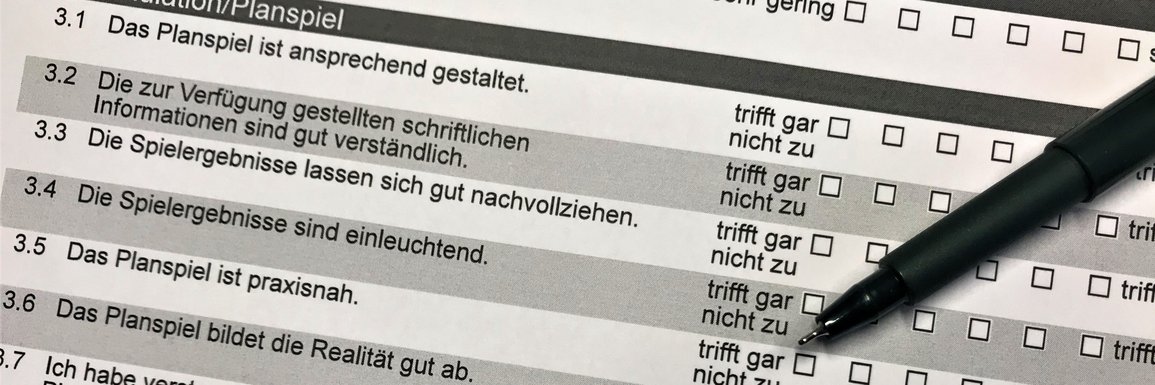
Research Projects at the ZMS
Evaluation of Simulation Games at the ZMS
Prof. Dr. Friedrich Trautwein and Tobias Alf
Simulation games have been held at the ZMS since 2008. Meanwhile, about 25 different simulation games are used in about 200 events every year. As a competence center for simulation games, we are not only connected to practice, but also to research. Therefore, we ask ourselves in which simulations students and teachers see the greatest added value. And: How must teaching with simulation games be structured and organized in order to bring the greatest possible benefit?
According to Rindermann, successful teaching results from an interplay of framework conditions, the teachers and the students. For teaching specific to simulation games, the quality of the simulation game and the teamwork have to be added. With these influencing factors, a questionnaire was developed at the ZMS and subjected to a pretest with approx. 180 data sets. After some adjustments we are currently in the phase of data collection and use the questionnaire in many simulation events. Publications on different questions are planned.
Links to questionnaires:
Effects of Simulation-based Learning in Management Education
Christian Hühn, M.A.
Complex economic decision-making situations require future managers to have sound specialist knowledge on the one hand and broad-based problem-solving skills on the other. Often, many management training programs have been described as having little practical relevance, as they hardly prepare comprehensively for the requirements of future managers against this background. Simulation-based learning (SBL) follows a strictly practice-oriented learning approach. In realistic decision-making situations, learners can practice their decision-making behavior without fear of making momentous mistakes. SBL environments are often competitive in nature. The often team-based structure adds an additional dynamic that further increases the realism. Now that SBL environments have been used in academic teaching in the USA and other countries for some time, this learning approach is also becoming increasingly established in German universities. Despite the pressing issues involved, business games have not yet been widely researched, especially in the business environment. The results so far are broad and raise follow-up questions, the answers to which seem to be immensely important for an efficient use of business games in management education. The research project wants to make its small contribution to this. Four sub-studies will contribute to (1) compiling and evaluating results (systematic literature review), (2) testing new research instruments to gain better insight into the simulation process (explorative study using process journals), (3) investigating in depth questions about the simulation experience (cognitive and affective) of business students (digital questionnaire study using the tested process journals with 3rd year students), and (4) conducting a survey of the simulation process. (4) to compare different cohorts, especially at the end and beginning of the study period (digital questionnaire study using the tested process journals with 1st year students). In this way, the research project aims to contribute to further improving the facilitation of business simulation games in terms of the learning experience for students. The cumulative research project takes place in cooperation between the University of Mannheim, Chair of Business Education - Learning in the Work Process (Prof. Dr. Andreas Rausch) and the ZMS of the DHBW Stuttgart (Prof. Dr. Friedrich Trautwein). Data collection has been completed, data analysis is ongoing. First results are currently in the publication process.
Simulation game - learning - learning transfer. A subject-oriented analysis of influencing factors
Dr. Sebastian Schwägele
For over three centuries, simulation games have been developed to enable people to learn in a realistic environment. There is no question that simulation games or methods similar to simulation games are used in almost all large companies and universities in Germany today. Although the use of the simulation method is usually intended to bring about a lasting change in the participants and in their future knowledge and actions, the question of learning transfer has hardly been addressed in the scientific discourse so far. This paper addresses this gap.
The interview-based, qualitative study examines the use of the business game method as a learning environment. The learning processes during a simulation participation are analyzed, as well as two different learning transfer processes - the transfer of what has been learned into the context of the simulation and from there into the everyday life of the subject. The focus is on the identification of factors influencing these processes, which from a subjective perspective are considered to be conducive or obstructive.
The results provide an empirically sound basis for optimizing future simulation seminars from a didactic and methodological perspective in order to promote learning transfer.
Sebastian Schwägele's dissertation, which he completed at Otto Friedrich University in Bamberg in 2015, was written as part of the research project.
